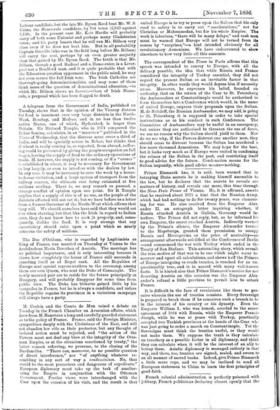A telegram from the Government of India, published on Tuesday,
shows that in the opinion of the Viceroy distress for food is imminent over very large districts in the North- West, Bombay, and Madras, and in no less than twelve native States, one of which, Hyderabad, is larger than Britain. Sir Richard Temple, who in 1874 conquered the Behar famine, calculates, in an " interview " published in the Times of Wednesday, that the distress must cover a third of India, and will be specially severe in Behar, but thinks that if wheat is really coming in, as reported, from abroad, suffer- ing could be prevented by giving the people occupation on full wages, leaving the supply of food to the ordinary operations of trade. If. however, the supply is not coming, or if a " corner " established in wheat, it may be necessary for Government to buy largely, or even to interfere with the dealers by law. In any case it may be necessary to save the weak by a house- to-house visitation, and a large system of transport from the railway centres, the ultimate cost being estimated at five millions sterling. There is, we may remark en passant, a strange conflict of opinion upon one point. Sir R. Temple implies that a supply of rice is of no use, as the people of the districts affected will not eat it; but we have before us a letter from a former Governor of the North-West which affirms that they will. We should ourselves have said that they would eat rice when starving, but that like the Irish in regard to Indian corn, they do not know how to cook it properly, and, conse- quently, dislike the food. It is very strange that any uncertainty should exist upon a point which so nearly concerns the safety of millions.


















































 Previous page
Previous page